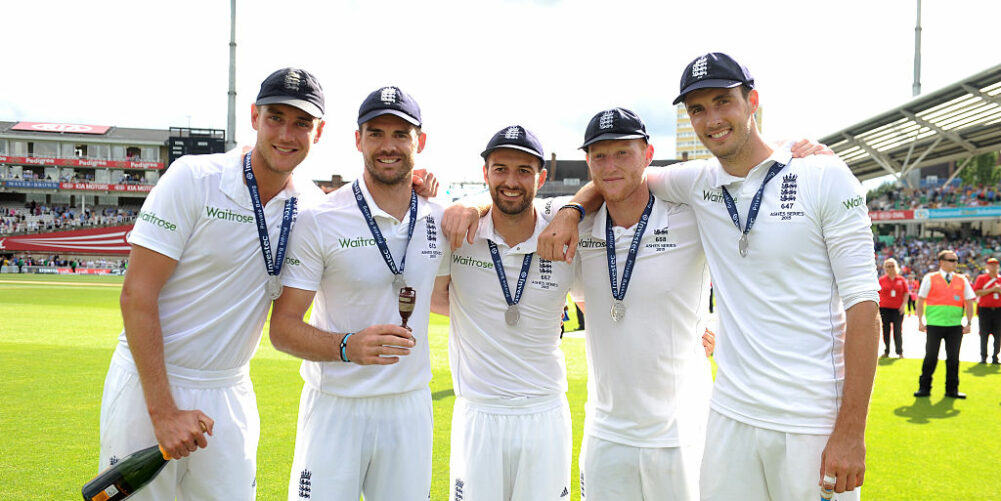Jonny Bairstow was unequivocal about it, as when playing one of his cultured heaves to leg. Winning the World Cup in this deluxe summer would be more important to him than winning the Ashes.
Perhaps rarity value won out. This is the 12th World Cup since the trophy’s inception in 1975 and while England have thrice contested the final, the main prize has never gathered dust in their possession.
On the other hand, Bairstow has been part of an Ashes-winning England side on two occasions, both of them at home.
It might also be a generational thing. I’m speculating here
but I reckon if Jonny’s father, David, were asked the same binary question when
he was alive: Ashes or World Cup (and he played four Tests and 21 ODIs)? He’d
have opted to win the Ashes.
I recall the same question being posed just before the 1999
World Cup, the last time the tournament was held in England. The answer then
from the game in this country was mixed, with a small majority feeling that
cricket in England, then undergoing one of its existential crises, would
probably prosper more if the team won the World Cup. It was, as Wisden put it
at the time: “The game’s chance to re-establish itself in the public’s
affection.”
The argument ran thus. Here was a big, global event which
despite the best efforts of those in charge, had still caught the attention of
many not usually interested in cricket. Certainly, there were brands and
sponsors involved for whom cricket was not usually a target. Win something like
that, it was felt, when everyone is watching and suddenly it becomes a national
event, like the Ashes in 1981 and 2005.
You need to be careful for what you wish and instead of
propelling and increasing the popularity of cricket into the new millennium,
the 1999 World Cup is held up as a nadir of how not to run or contest a global
tournament. In what must be one of the biggest shambles in a sport not short on
cock-ups, hosts England were knocked out before the World
Cup song had been officially released.
The misery began with the admittedly weather-hit opening ceremony at Lord’s, attended by Tony Blair – the then Prime Minister – which ended up the epitome of smoke and mirrors, with an emphasis on the former.
Yet even more worthy of ridicule were the World Cup ambassadors, a motley bunch of D-list ‘celebrities’ such as American model Caprice Bourret and Johnny Ball. Anneka Rice, another celebrity this time from TV, was the ‘face’ of sponsor Outspan, though she soon let slip that she thought cricket as “boring as fishing”.
It was a similarly moment of swingeing embarrassment, this
time for England’s players in the 2015 World Cup, which drove the
improvements you see in the current team under the stewardship of captain Eoin
Morgan and coach Trevor Bayliss.
For a good three decades after international one-day cricket was thrust upon a cricket world suspicious of fad or fashion, the shorter form of the game was still seen as subservient to Test cricket, at least in England.
Yet, it was only after the humiliation suffered in 2015 that the England and Wales Cricket Board saw fit to appoint a coach with a specific brief to improve the team’s one-day standing.
It was Andrew Strauss’ call and one of his first as director of England cricket, a post he left last year due to his wife’s terminal illness. An updated form of the game had to be played and in Morgan and Bayliss he found willing travellers.

Coming into this World Cup England now play a dynamic brand of high-octane cricket – the sort of fast-paced entertainment you can enjoy at Best UK casino – that has taken them to the top of the world rankings in 50-over cricket.
“Playing with a swagger is almost as important as winning,” claims a sports marketing
acquaintance of mine. “The country needs something to escape from all this
Brexit drudgery and England doing well in a World Cup while playing an exciting
brand of cricket could be it.
“But do it in style and with cool and you’ll engage the country’s youth, which is what needs
to happen for the game to survive. Mind you, there is a big gap between kids
showing an interest in England’s World Cup fortunes and then going on to
actually play the game.”
If Morgan’s men do go on to win the World Cup, and on form they have their best chance for 27 years, you wonder what that would then do for the Ashes series that follows? Tickets for that may well have all but gone, but they have been bought by the long converted.
Would the ambivalent, now more excited about cricket on the back of an England World Cup win, now embrace the Ashes, one of the oldest grudge matches in sport, with similar gusto? Probably not.
Although cricket’s marketing men and women have previously argued that white-ball forms can be starter packs for the longer and more nuanced red-ball forms of the game, a link has not really been proven.
What the ECB will be hoping for is England success in both
events so as to create a tidal wave of publicity so that The Hundred, the new
competition they are introducing next year at great cost and disruption, can
carry all before it.
I’m not so sure. If you have World Cup winners as well as Ashes holders on your CV, as England’s cricketers could have come September, will a competition that seeks to mess with cricket’s foundations really win over recent converts afresh with some new hokum? But, first thing’s first, and we’ll worry about that after ticking the first two boxes on our summer wish list.
DEREK PRINGLE / Photo: Getty Images












